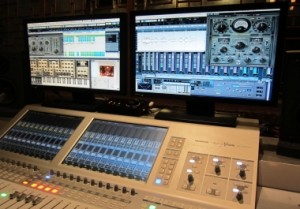What is audio Mastering and why is it so important?
music production technology Uncategorized
Date 27 April 2013

Many of our artists ask us why they need to master their songs, so we thought we should write about this important finishing touch in creating music.
Mastering is the final step in the music production and engineering process, the polish that makes the difference. It can determine if a song sounds great and professional, or poor-quality, making people want to press Skip or Delete, or consider you a low level artist.
So What Should Mastering Do?
- Evens out song volume levels and EQ or tone individual tracks to balance all the songs
- Raise the overall level in a way that is not destructive to the dynamics and prevents distortion
(There is a great debate about this in the digital age, watch this video and this one for more) - Correct minor mix deficiencies with equalization (top mastering engineer Bob Katz shows you this here)
- Enhance flow by changing the space between tracks, or mix tracks so they blend together
- Eliminate noises between tracks or other issues such as hiss, hum, clicks, even distortion
- Add additional data such as ISRC codes, CD-Text information
(Artist, Title, and Track Names that can be displayed by some CD players) - Dither audio a process that ensures when a high quality mix is reduced to CD quality or MP3, the lost data does not cause strange issues. More details in this video
- Create what is called a ‘Red Book Master’ that conforms to industry standard specs for duplication
- Most importantly, Make your music sound great on any sound system
In the time we live in with modern technology, mastering is more important than ever!
Why Is Mastering Important?
1) Compression & Reformatting: These days, music really takes a beating. Files are compressed at different quality levels using various technologies, sometimes repeatedly, user after user. Files are imported, converted, compressed, exported, broadcast, shared, burnt, downloaded and then reformatted for the next user experience. There are dozens of public and specialized music formats used by various digital retailers, subscription services, internet radio and websites.
The point is, each of these processes change something. They often exaggerate things such as high frequencies (cymbals will sound more brittle) or eliminate some low end (bass and drum warmth) or just make the whole thing seem flat and lifeless.
2) Playback: OK, take all those variables above and multiply them by all the headphones, ear buds, car stereo systems, iPod docks, computer speakers, home stereos, TV speakers, and worst of all, mobile phone speakers (the number one way much of the world hears music now)
Will that song sound great on Dr Dre headphones and Apple earbuds? On a mobile phone and in the car? How about in the club? A great master will ensure consistent and pleasing results when played ANYWHERE.
3) Professionalism & Impartiality: A fresh set of ears, using a different pair of great speakers and gear in a new environment, ensures professionalism and impartiality required to prepare songs for the modern world. It’s less about opinion and artistry, and more about ensuring survivability and maximizing flexibility.
It is important to address the attempt in mastering to match an overall sonic quality as it compares to other artists within the genre as well as volumes. This has led to a destructive ‘Volume War’ the results of which can be seen in this video and this one.
A lot of people these days think mastering is about using some limiting software after watching a youtube video. Let’s make something very clear here. Mastering has little to do with using software to trick the listener into thinking your music is mastered! It is most importantly about the ears of the audio engineer who is doing the mastering. And in my opinion, if the audio engineer has been working in this field for less than 10 years, they probably don’t have the ears to be able to do the job right. Secondly, mastering is about some highly specialized and expensive tools used to do the job right, which may include analog equipment as well as digital software.
All to say, Mastering is more important than ever and every artist should make sure every music release is professionally mastered before unleashing it to the world.
– Pro Soul Studios audio engineer, Jarome Matthew
